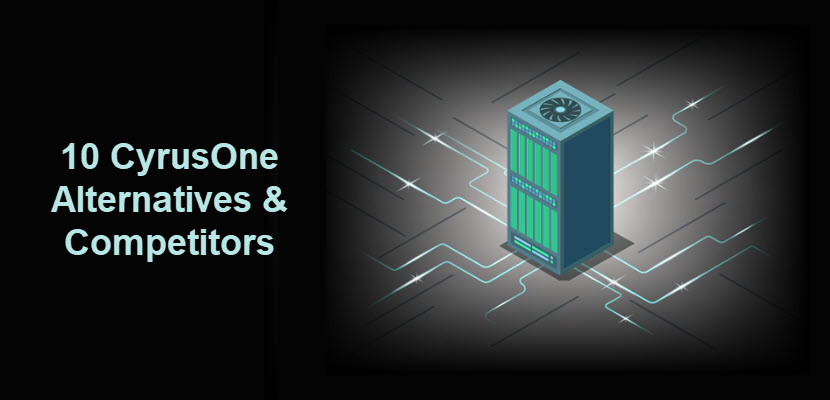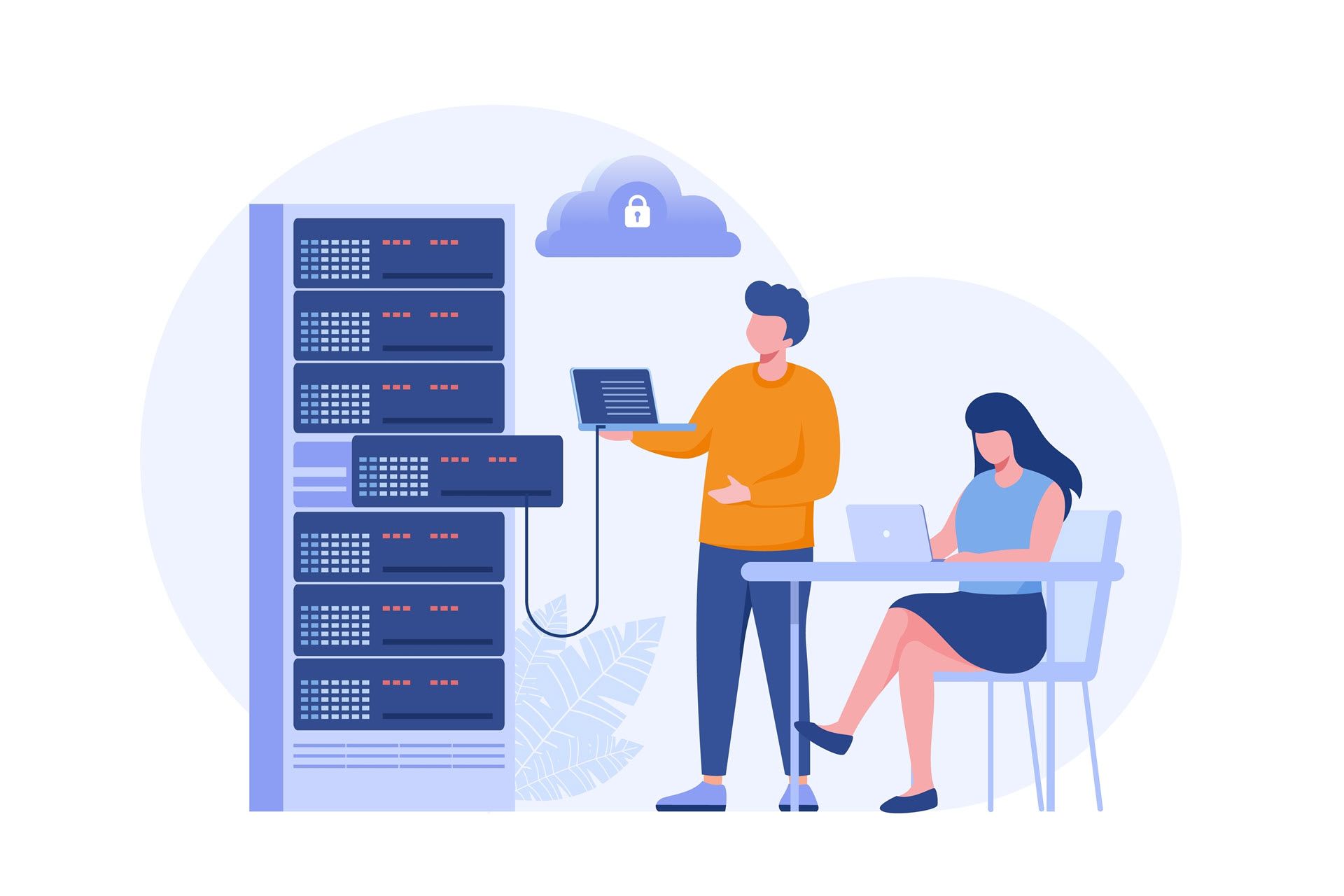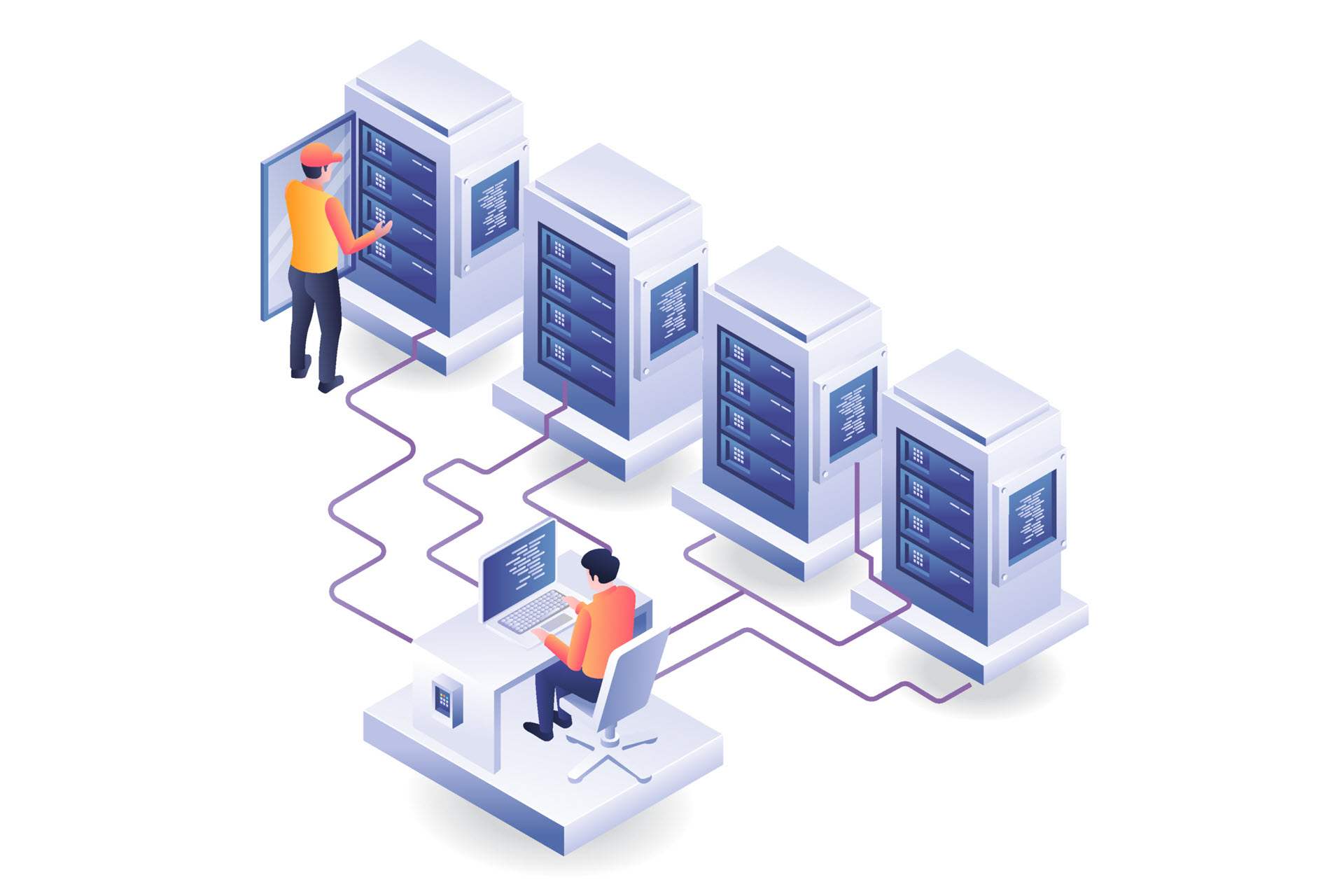CyrusOne is a leading hyperscale data center and colocation service provider offering high-performance enterprise solutions. However, businesses seeking alternatives may prioritize different factors. Those who require global reach, connectivity, compliance, or environmental sustainability benefit from looking into alternatives.
The article presents the top 10 CyrusOne alternatives and competitors that help you address key issues, such as IT infrastructure safety, latency, and hybrid cloud support. Before choosing a provider, consider factors such as location, scalability, and regulatory compliance.

10 CyrusOne Alternatives
Selecting a colocation provider that aligns with business goals is crucial. Enterprises seeking to improve overall performance and optimize infrastructure should make an informed choice. Although CyrusOne is a leading provider in this field, alternatives can offer unique advantages.
Before making a decision, organizations should analyze their specific colocation needs to identify the best fit for their operations. Some may require low-latency networking, while others focus on security standards.
Below, we explore the top 10 CyrusOne alternatives, including their key features and strengths.
phoenixNAP
phoenixNAP is a global IT services provider offering secure colocation options, cloud, and dedicated servers. The infrastructure is designed for high-performance workloads and caters to enterprises requiring scalability and flexibility.
With SLA-backed uptime, phoenixNAP offers the most connectivity options compared to other Phoenix-based data centers. The provider focuses on providing a hybrid IT infrastructure and caters to performance-driven businesses that do not compromise sustainability.

The main characteristics are:
- Size. phoenixNAP operates multiple Tier III and Tier IV data center locations to provide worldwide coverage. Currently, there are several in North America, Europe, and the Asia-Pacific region, with plans for further expansion to support growing demands.
- Connectivity. The provider has a robust global and carrier-neutral network with direct cloud on-ramps to AWS and Google Cloud. It has peering exchanges, BGP routing optimization, and an infrastructure for high-throughput workloads.
- Latency. phoenixNAP optimizes its network routes to ensure ultra-low latency for industries such as real-time data processing, finance, and gaming. It utilizes Megaport for direct interconnects.
- Compliance. Follows strict industry compliance and security standards to ensure regulatory data center compliance. It includes SOC 2, HIPAA, and PCI DSS certifications.
- Environmental impact. phoenixNAP uses energy-efficient technologies and takes the initiative to create sustainable data center operations.
- Support. Provides 24/7 technical support and on-site security to prioritize efficiency, troubleshooting, maintenance, and safety.
Equinix
Equinix is a large global colocation provider that offers extensive interconnection services. The provider works with enterprises, cloud providers, and network operators.
It has a large interconnection ecosystem and a vast global footprint. The interconnection capabilities are ideal for enterprises that require global connections, especially in hybrid and multi-cloud environments.

The key features are:
- Size. Equinix has over 250 data centers in over 70 worldwide markets. Its global reach and scalability options are significant compared to other providers.
- Connectivity. Provides carrier-neutral ecosystems with direct connections to major cloud providers.
- Latency. The colocation provider has ultra-low latency, which is suitable for high-frequency trading, AI workloads, and enterprise cloud solutions.
- Compliance. Adheres to strict regulations, including ISO, SOC, PCI DSS, HIPAA, and GDPR.
- Environmental impact. Committed to renewable energy and carbon-neutral operations. It is a leader in sustainable data centers.
- Support. Provides 24/7 remote services and a dedicated engineering support team to ensure uptime.
Check out our list of Equinix competitors and alternatives.
Digital Realty
Digital Realty is another global colocation provider that offers interconnection services. They focus on catering to businesses that require a scalable and secure data center. Digital Realty enables seamless connections across cloud, network, and IT service providers.
The provider is highly scalable and has seamless hybrid cloud integrations. By focusing on cloud-first solutions, enterprises can use Digital Realty to connect to other cloud providers.

The main features of Digital Realty are:
- Size. Over 300 data centers in over 50 major global markets offer extensive geographic coverage.
- Connectivity. Support for both hybrid cloud and hyperscale interconnectivity. Carrier-neutral access is available.
- Latency. High-speed optimization and secure networking ensure minimal delays in data transmission.
- Compliance. Digital Realty maintains compliance with HIPAA, SOC, and ISO standards.
- Environmental impact. The provider regularly invests in renewable energy initiatives to minimize its carbon footprint.
- Support. Provides dedicated support teams and managed IT services to ensure operational reliability.
Discover Digital Realty competitors.
CoreSite
CoreSite is a high-density colocation provider that offers secure and scalable solutions. The provider focuses on flexibility and interconnection services for industries like cloud, healthcare, finance, and media.
CoreSite provides high-density colocation with a focus on real-time data processing. It offers ultra-low latency, an essential factor for cloud providers, finance, and media businesses.

The key features of CoreSite are:
- Size. CoreSite operates 25 data centers and covers major US markets, including Los Angeles, Silicon Valley, and New York.
- Connectivity. Provides carrier-neutral ecosystems and supports direct connections for major cloud providers, such as Google Cloud, AWS, Microsoft Azure, IBM Cloud, and Oracle Cloud.
- Latency. Offers low-latency options to ensure minimal delay, which is especially useful for enterprises with real-time data processing and high-performance requirements.
- Compliance. Meets various industry standards, including HIPAA, SOC 2, PCI DSS, and ISO certifications.
- Environmental impact. The company operates energy-efficient data centers and promotes renewable energy initiatives.
- Support. CoreSite provides 24/7 technical support, on-site staff, and managed services to assist with infrastructure troubleshooting and management.
Learn about CoreSite alternatives
Iron Mountain
Iron Mountain is a global colocation platform focusing on highly regulated and compliance-driven industries, including government sectors, healthcare, and finance. It specializes in business continuity, disaster recovery, and physical security.
Iron Mountain is an industry leader in compliance and disaster recovery solutions. With an emphasis on physical security, they cater to businesses with high data protection and recovery standards.

Key features include:
- Size. Iron Mountain has a global network with over 15 data centers across three continents. The facilities are large-scale and secure by design.
- Connectivity. Offers flexible connectivity options with direct access to cloud providers, carriers, and network operators. Supports both hybrid and multi-cloud environments.
- Latency. Focuses on high-speed connectivity with low-latency services. Highly regulated industries can depend on optimal performance for critical workloads.
- Compliance. Iron Mountain is known for its focus on compliance and regulations. It meets rigorous standards (HIPAA, SOC 2, ISO 27001, PCI DSS, and others). It is a suitable provider for highly regulated sectors.
- Environmental impact. The colocation provider is committed to sustainability and aims to minimize its carbon footprint by turning to renewable energy initiatives and integrating green practices into their operations.
- Support. Provides 24/7 technical support, remote hands, and various managed services to ensure efficient operations. The staff is highly trained and available at all times.
Learn about Iron Mountain alternatives.
Cologix
Cologix is a network-neutral colocation provider. It focuses on high-connectivity data centers in edge markets across North America. Enterprises, cloud providers, and carriers rely on its infrastructure to optimize network performance and improve scalability.
Cologix thrives in edge locations and appeals to low-latency services in key hubs across North America. The strategic locations in high-demand regions make it a great choice for businesses looking to optimize their networking infrastructure at the edge.

Its features are:
- Size. Cologix has more than 40 data centers in 11 U.S. and Canadian markets. The company focuses on edge locations and key interconnection hubs, such as Montreal, Toronto, Dallas, and Vancouver.
- Connectivity. The provider has a dense interconnection system with direct access to over 700 networks, including major cloud providers and internet exchanges.
- Latency. By targeting edge markets, Cologix ensures low latency for enterprises, CDNs, and cloud services. The provider uses optimization techniques to improve network routes and reduce congestion.
- Compliance. Follows strict security and compliance standards, including SOC 1, SOC 2, HIPAA, PCI DSS, and ISO 27001. It is suitable for businesses with strict regulatory requirements.
- Environmental impact. Cologix commits to carbon reduction and green power procurement. They aim to create a sustainable, energy-efficient infrastructure through renewable energy initiatives.
- Support. Provides 24/7 on-site support with remote hands services.
TierPoint
TierPoint is a hybrid IT and colocation provider. They specialize in edge computing, managed cloud services, and disaster recovery. TierPoint suits enterprises seeking a secure, stable, high-performance IT structure in the United States.
Its hybrid solutions are suitable for companies requiring both colocation and cloud-based disaster recovery. TierPoint's primary focus is on edge computing and providing regional coverage, which makes it suitable for businesses that require a stable IT infrastructure in disaster-prone areas.

Key features of TierPoint are:
- Size. TierPoint operates over 40 data centers across more than 20 markets in the U.S. They have regional coverage but focus on enterprise clients that require edge computing and disaster recovery solutions.
- Connectivity. Data centers provide carrier-neutral colocation. Multiple connectivity options are possible, including direct access to AWS, Google Cloud, and Microsoft Azure.
- Latency. TierPoint minimizes latency for businesses that require fast and reliable data transmission by focusing on a strong presence in regional and edge markets. It is a suitable solution for real-time technologies.
- Compliance. Meets strict regulatory and security standards, including SOC 2, HIPAA, PCI DSS, and ISO 27001.
- Environmental impact. TierPoint integrates sustainability into its data center designs by optimizing power and cooling to reduce environmental impact.
- Support. Offers 24/7 on-site support, managed IT solutions, and remote hands services. Businesses are guaranteed expert assistance when required.
Check out our list of TierPoint competitors.
Vantage Data Centers
Vantage Data Centers is a wholesale data center provider focusing on enterprise customers and hyperscale. It provides scalable and custom solutions to address the needs of high-performance workloads.
With its large-scale data centers, Vantage focuses on sustainability. It specializes in hyperscale data centers that provide the space needed for large enterprises. Their sustainability efforts are notable and appealing to environmentally conscious companies.

The key features are:
- Size. Vantage operates across North America, Europe, and Asia. With over 30 data centers, the company continues to expand into emerging markets to address growing demand.
- Connectivity. Offers carrier-neutral facilities with direct access to cloud providers and multiple network carriers.
- Latency. The infrastructure supports ultra-low latency applications by design. It's applicable to AI, cloud computing, and financial services.
- Compliance. Meets typical high regulatory standards, including PCI DSS, HIPAA, and ISO certifications.
- Environmental impact. Vantage Data Centers aims to achieve net-zero carbon emissions through renewable energy and energy-efficient cooling systems.
- Support. Security, remote hands, and managed services are available 24/7 to ensure uptime and optimal performance.
Flexential
Flexential is a hybrid IT solutions provider that offers colocation and other services. The company focuses on providing a high-performance infrastructure to support enterprises with demanding workloads, compliance needs, and scalability options. They also offer disaster recovery and managed services.
Its primary focus is enterprise-grade hybrid IT solutions and large-scale disaster recovery options. The data center locations are strategic and provide both performance and geographic resilience. Flexential appeals to businesses that require operations during regional failures.

Its key features are:
- Size. Flexential operates over 40 data centers across 19 U.S. markets to provide nationwide coverage. They focus on edge computing and enterprise IT solutions.
- Connectivity. With a 100 Gbps backbone, the company supports high-throughput applications. They offer carrier-neutral colocation with direct connect options to major cloud providers.
- Latency. Data centers are strategically located to ensure low latency. Businesses that rely on real-time processing, cloud applications, and disaster recovery solutions benefit from the stable connection.
- Compliance. Adheres to rigorous compliance standards, and it is suitable for industries with strict regulatory demands.
- Environmental impact. Flexential uses energy-efficient designs and renewable energy to minimize environmental impact with its data centers.
- Support. Offers 24/7 technical support, on-site security, fully managed IT solutions, and remote hands services.
QTS Data Centers
QTS Data Centers is a large-scale colocation and cloud services provider. It is known for secure, compliant, and high-performance facilities. The provider addresses the needs of enterprises, government agencies, and hyperscale clients.
QTS is known for its Service Delivery Platform (SDP), which provides a real-time view of power, cooling, and space usage. They prioritize sustainability and use 100% renewable energy in many facilities. The hybrid cloud and colocation provider caters to enterprises that require transparency and flexibility.

Key features include:
- Size. QTS runs over 20 data centers across North America. It provides large-scale colocation space and high-density deployments.
- Connectivity. The provider offers carrier-neutral colocation with direct cloud on-ramps to AWS, Google Cloud, Microsoft Azure, and other cloud platforms.
- Latency. Optimizes interconnection strategies to reduce latency. It is suitable for enterprises with high-speed data transmission requirements.
- Compliance. Compliant with standards such as FedRAMP, FISMA, HIPAA, SOC1 & 2, PCI DSS, and ISO 27001.
- Environmental impact. Integrates 100% renewable energy in certain facilities and adopts energy-efficient designs for its centers.
- Support. QTS has 24/7 technical support, remote hands, and a dedicated real-time monitoring and management portal.
CyrusOne Alternatives: How to Choose
Before selecting a CyrusOne alternative, it's crucial to define the business requirements for a data center provider. CyrusOne specializes in colocation services, but depending on your business requirements, there are providers with different strengths.
By carefully evaluating these factors, you can select a CyrusOne alternative that aligns with your operational needs and strategic goals.
Consider the following when evaluating alternatives:
- Geographic reach. CyrusOne has a strong presence in North America and Europe. If you require data centers in Asia, the Middle East, or other regions, look for providers with a global footprint.
- Managed services. CyrusOne primarily offers colocation, meaning businesses handle their own infrastructure. For fully managed services, consider alternatives that provide cloud hosting, managed IT, or hybrid solutions.
- Network connectivity. Low-latency, high-bandwidth connections are essential for performance. Some alternatives offer direct cloud on-ramps, carrier-neutral interconnections, and private networking options.
- Scalability and flexibility. For rapidly growing businesses, ensure the provider can accommodate your growth. Look for providers that cater to future expansion with flexible contracts, additional power capacity, and on-demand resources.
- Security and compliance. For regulated industries, ensure the provider meets compliance requirements such as HIPAA, PCI DSS, ISO 27001, or SOC 2.
- Sustainability. CyrusOne has some sustainability initiatives. However, if carbon neutrality or renewable energy use is a priority, look for providers with stronger environmental commitments.
- Cost structure. Colocation pricing varies based on power usage, rack space, connectivity, and additional services. Compare providers based on their pricing models and total cost of ownership (TCO).
Learn more about how other colocation providers stack up in our analysis of Switch Data Center competitors and alternatives.
Choosing the Right Alternative
By carefully evaluating different colocation providers, businesses can determine which is the best one depending on specific business needs, like scalability, compliance, connectivity, and sustainability. Although CyrusOne is a leader in this industry, alternative providers have distinct advantages that can better align with business goals.



